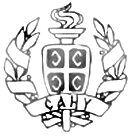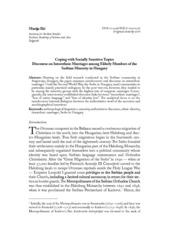Приказ основних података о документу
Coping with Socially Sensitive Topics. Discourse on Interethnic Marriages among Elderly Members of the Serbian Minority in Hungary
| dc.creator | Ilić, Marija | |
| dc.date.accessioned | 2018-11-09T13:19:56Z | |
| dc.date.available | 2018-11-09T13:19:56Z | |
| dc.date.issued | 2010 | |
| dc.identifier.issn | 0350-7653 | |
| dc.identifier.uri | https://dais.sanu.ac.rs/123456789/4309 | |
| dc.description.abstract | Drawing on the field research conducted in the Serbian community in Szigetcsép, Hungary, the paper examines interlocutors' oral discourse on interethnic marriages. Until the Second World War, the Serbs in Hungary, rural communities in particular, mainly practised endogamy. In the post-war era, however, they tended to be among the minority groups with the highest rate of exogamic marriages. Consequently, the interviewees established discourse links between 'interethnic marriages', 'loss of native language' and 'fear of identity loss'. The analytical focus is on the interlocutors' internal dialogism between the authoritative word of the ancestors and autobiographical assertions. | en |
| dc.publisher | Belgrade : Institute for Balkan Studies, Serbian Academy of Sciences and Arts | |
| dc.relation | info:eu-repo/grantAgreement/MESTD/Basic Research (BR or ON)/178010/RS// | |
| dc.rights | openAccess | |
| dc.rights.uri | https://creativecommons.org/licenses/by-nc-sa/4.0/ | |
| dc.source | Balcanica | |
| dc.subject | anthropological linguistics | en |
| dc.subject | minority | en |
| dc.subject | authoritative discourse | en |
| dc.subject | ethnic identity | en |
| dc.subject | interethnic marriages | en |
| dc.subject | Serbs in Hungary | en |
| dc.title | Coping with Socially Sensitive Topics. Discourse on Interethnic Marriages among Elderly Members of the Serbian Minority in Hungary | en |
| dc.type | article | |
| dc.rights.license | BY-NC-SA | |
| dcterms.abstract | Илић Марија; | |
| dc.citation.spage | 33 | |
| dc.citation.epage | 53 | |
| dc.citation.issue | XLI | |
| dc.identifier.doi | 10.2298/BALC1041033I | |
| dc.type.version | publishedVersion | en |
| dc.identifier.fulltext | https://dais.sanu.ac.rs/bitstream/id/21257/4420.pdf | |
| dc.citation.other | (41): 33-53 | |
| dc.identifier.rcub | https://hdl.handle.net/21.15107/rcub_dais_4309 |

